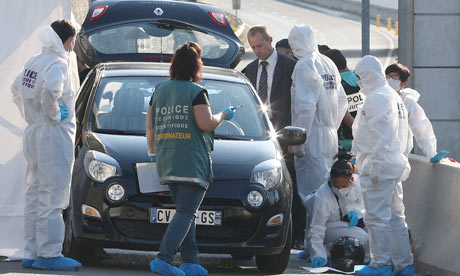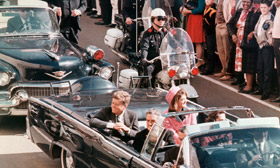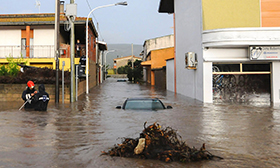The French government will lead crisis talks on Saturday over a spate of gangland murders in Marseille, after the shooting of a football boss's son – the 15th gun death this year – sparked soul-searching over the Mediterranean city's inability to shed its image as the "Chicago of the south".
Adrien Anigo, 30, whose father, José Anigo, is sporting director of Olympique de Marseille, was shot dead in broad daylight on Thursday by two men on a motorbike while he was driving a rented Renault Twingo.
The father of two, who ran a brasserie, was well known to police. He had been under investigation over jewellery store armed robberies carried out by a local gang and had been due to appear in court in the near future. In the past he had served time in prison on remand before being released over a judicial error, French media reported.
Anigo's father grew up on a poor estate before becoming a player at Marseille, one of France's oldest and most popular clubs, and then sporting director. Anigo Sr, an imposing figure, has always denied having any mafia or crime links of his own. Two years ago, asked by the Journal du Dimanche about his son, he said: "The street sucked in my son, but that's got nothing to do with anyone but the justice system."
Hours before Anigo was killed, a 24-year-old man was gunned down at La Ciotat just outside Marseille after masked men on motorbikes tracked him arriving at his place of work.
The government is under pressure to act on the violent crime that has blighted Marseille as it tries to shed its old image as a city of gangs, drug deals, corruption and political clientelism. The ongoing problems have cast a shadow over Marseille's stint as European capital of culture this year. While tourist numbers have risen sharply in the past six months, with the city aiming to attract 10 million visitors this year and the new Museum of the Mediterranean hailed as an architectural masterpiece, French headlines have been dominated by gang murders.
This year's death toll has not yet matched 2012's exceptionally high total of 24 gang killings in the Bouches-du-Rhone area including Marseille, but the methods have alarmed authorities. Increasingly, AK47s – reportedly available for €500 each – are being used to settle scores. Execution-style killings, once described by the state prosecutor as Marseille's "regrettable speciality", persist.
The interior minister, Manuel Valls, has ordered together all political parties, saying: "I understand the anger of the Marseille people but we need time [to act] against drug-trafficking and daily delinquency." He called a truce on the left-right political slanging matches over who was to blame. The rightwing mayor of Marseille, Jean-Claude Gaudin, has denounced France's "Marseille-bashing".
Last month the state sent 130 extra riot police and 24 investigators to Marseille. but many observers say the problem runs deeper. Although Marseille has recovered from the 1990s horror years of industrial decline, unemployment remains above the national average and more than 20% of residents live below the poverty line. Some estates have more than 40% youth unemployment, and young people have few prospects but the "underground economy" of drug deals.
Marie-Arlette Carlotti, a government minister competing in the Socialist primary race to choose a Marseille mayoral candidate next year, said the "real mafia networks" must be neutralised. "We have to find out where the money is, the white collars, because there are bosses in all this, even if the mafia is less well-organised than it was in the past. We have to look at exterior signs of wealth, trace the networks to their bank accounts in protected places."
Marseille had hoped to move on from its long history of organised crime and murderous mobsters with names such as The Belgian, The Blond or The Tomcat. After the second world war, Marseille gangs known as the "French Connection" ran vast illegal laboratories processing heroin coming in from Turkey and the east. By the late 60s, about 80% of heroin in the US was trafficked from Marseille. In 1971, the figure of the Marseille drug baron was immortalised in the Hollywood film the French Connection.
Marseille is no longer a heroin or drug-processing capital, but it remains at the centre of the trade in cannabis coming into Europe through Spain from Morocco. The city is also a key point in the cocaine smuggling route into Europe from South America through west Africa. But local dealing on poor housing estates is now at the centre of its problems. Mothers complain that young men are falling victim to increasingly violent attacks over petty fallings-out or small debts.



















